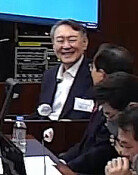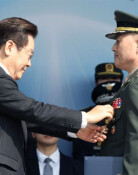Uri Party Loses Support from Voters in Their 20s
Uri Party Loses Support from Voters in Their 20s
Posted May. 24, 2005 03:36,
We are losing ground.
In the ruling Uri Party, a sense of crisis is growing. With a failure to demonstrate strong leadership in state affairs and a series of scandals touching some party members, support levels for the party are crashing.
Party officials moan and sigh that there seems to be no breakthrough.
Less Support from Younger Voters-
The Uri Party has had more dominant support from voters in their 20s and 30s the Grand National Party (GNP). However, indications that younger voters are turning their back on the ruling party are becoming evident recently.
In a survey taken on May 10 by the Korea Society Opinion Institute (KSOI), the ruling party fell behind the GNP by 0.1 percent in the support rate of people in their 20s. In fact, the Uri Partys support level lagged behind that of the opposition Grand National Party in every age group with an exception of those in their 30s.
On May 16 younger voters may have been offended by a remark to university students made by Ryu Si-min, a member of the partys standing committee, that the responsibility for ones unemployment should be taken by oneself. Representative Ryu explained right after the remark that his intention was misunderstood, but netizens poured their angry voices on the Internet.
The allegation that Rep. Lee Kwang-jae intentionally evaded compulsory military service by cutting his finger further aggravates the situation. Because the Uri Party took advantage of the evasion scandal of GNP candidates sons in the last two presidential elections, even an unconfirmed evasion scandal could take a heavy toll on the partys support ratings.
Political Science professor Kim Hyung-jun of Kukmin University said, It is true that recently, those in their early 20s can no longer be regarded as ruling party supporters, and added, I dont agree with the GNPs opinion that the twenty-somethings are turning into conservatives, but the ruling party cannot assuredly get their votes any more as well.
Surrounded by Hostile Generations-
It seems that older voters antagonism against the Uri party seems to be getting firm. Also indicative of this trend is the presiding negative sentiment against the 386 generation--those who are in their 30s, attended university in the 1980s, were born in 1960s, and who are now serving in positions of power.
In a survey on the social influence of 386 generation last month, every age group gave higher rates of negative answers than positive, except those in their 30s. In particular, among those in their 50s, negative answers (62.3 percent) were more than double the number of positive ones (25.3 percent).
Former Uri Party chairman Chung Dong-youngs disparaging remark against senior citizens still seems to have lingering effect on those in their 60s and older. During the 17th general election in April of last year, he said that people in their 60s and 70s dont have to go to the polls and can just rest at home.
A Seed of Discord Still Remains-
The debate on the party reform, suggested after April 30 by-elections, also triggered factional conflicts, which led to a lack of leadership.
Each faction of the party is devoting themselves to securing party members to take control over nominations in next years local elections. Meanwhile, party leaders and practical-minded factions argue that other methods need to be implemented in tandem with the current membership voting system in deciding candidates for public official positions, but the progressive-minded faction is strongly opposing to this suggestion.
The two-headed system of chairman and floor leader also shows signs of discord. Rep. Moon Hee-sang had to leave his chairman position at the Assemblys intelligence committee because he was elected as a party leader in April, but failed to appoint a successor for two months, as the two sides wage war of nerves
Yeon-Wook Jung jyw11@donga.com



![지하철 타고 가는 북한산성…외국인도 반한 ‘K등산 맛집’[전승훈 기자의 아트로드]](https://dimg.donga.com/c/138/175/90/1/wps/NEWS/IMAGE/2026/01/10/133120824.1.jpg)


![두쫀쿠가 뭐라고…영하 8도에 아이들 1시간 줄세운 어린이집 [e글e글]](https://dimg.donga.com/c/138/175/90/1/wps/NEWS/IMAGE/2026/01/09/133126969.3.jpg)
